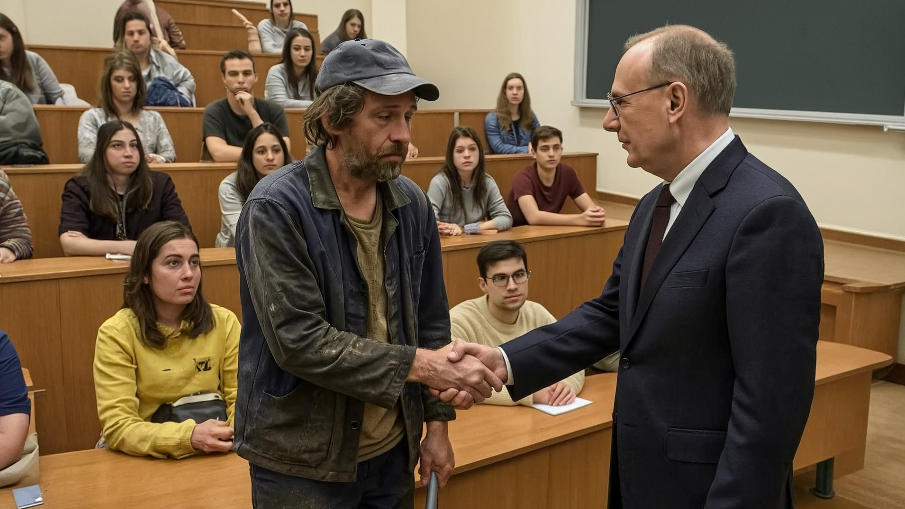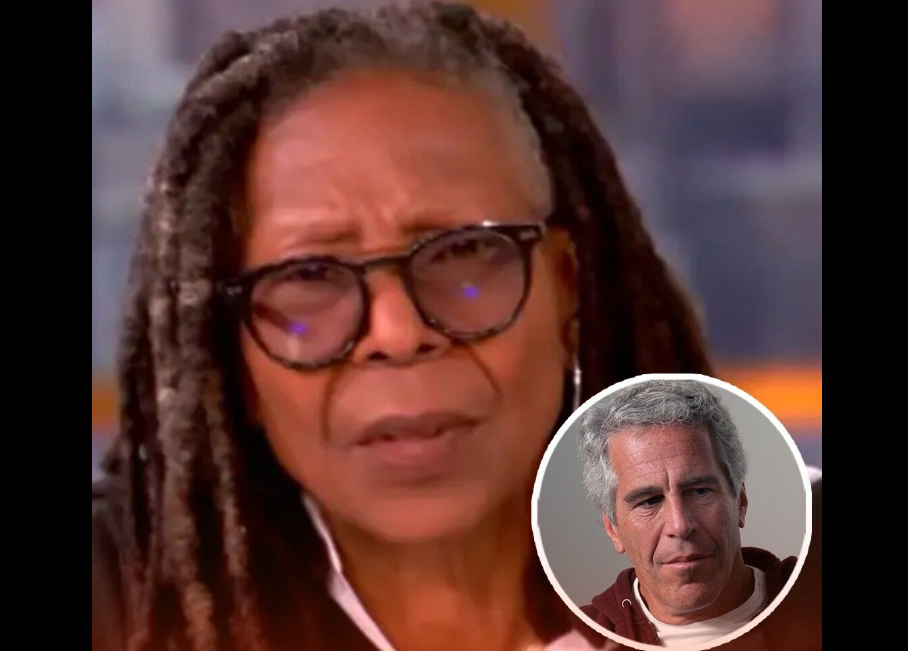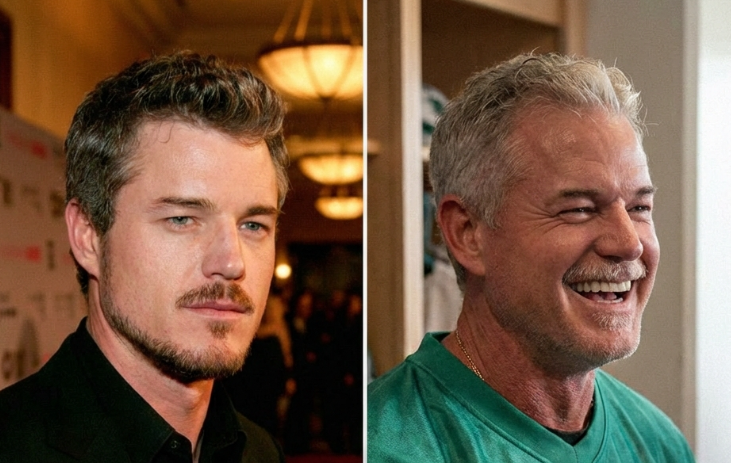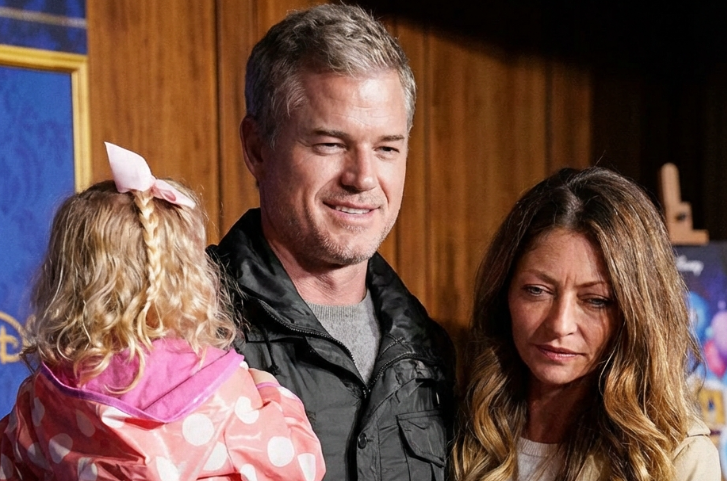He moved through the aisles like he was invisible.
Pushing a squeaky cart with a crooked wheel, the janitor mopped quietly as students trickled into the grand university auditorium. A few glanced his way, most did not. Some even stepped around the wet floor like it was a nuisance.
A pair of guys in the front row snickered as he passed.
“Man, he’s still here? You’d think after twenty years someone would give him a better mop,” one said, audible to the rows around him.
A girl scrolling on her phone laughed. “That guy probably knows every corner of this place better than the professors.”
“Yeah,” the other guy added. “All he has is a mop and a bucket.”
The janitor did not react. He kept moving.
He paused near the stage, gazing up at the empty podium where the guest speaker — a prominent entrepreneur, it seemed — was set to deliver a keynote on legacy, innovation, and impact. Rumor had it the dean himself had arranged for the speaker’s presence.
The seats filled. Anticipation grew.
Finally, the auditorium lights dimmed, and the dean stepped out.
“Ladies and gentlemen, thank you for joining us. Today we welcome a man whose story speaks for itself. A man who worked in silence while shaping the lives of thousands. A man who proves that greatness is not always loud — but is always present.”
Confused murmurs rippled through the crowd. Was this still the keynote introduction?
The dean continued. “We spend our lives chasing titles, applause, recognition. But this man — he built something larger than any of that.”
Then he turned toward the janitor, who had completed wiping a final corner and was quietly packing up.
And the dean said, his voice steady and full of pride:
“Please join me in welcoming the founder of the very scholarship program that put half this room through college…”
The crowd froze.
Heads turned. Mouths opened.
The janitor straightened his back. His eyes scanned the stunned auditorium.
As the room fell into shocked silence, the man reached into his pocket and pulled out a folded envelope.
Then he said, with a half-smile:
“Before we begin, there’s one more letter I need to read… and one person here who isn’t who they claim.”
One could have heard a pin drop.
The janitor — whose name no one seemed to remember — stepped up to the microphone. He adjusted it slowly, allowing people time to squirm in their seats. Some attempted to whisper, but no one knew what to utter.
“I know many of you do not know me,” he began. “And that is fine. I’ve spent twenty-three years traversing these halls with a mop and a flashlight. I’ve fixed every leaky pipe and replaced every burnt bulb. But this place… it is more than bricks and lights.”
He held up the letter. “This letter was sent to the foundation two weeks ago. It was anonymous at first — until we matched handwriting from past correspondence. The sender did not know I would be the one reading it today.”
A few eyes darted around the room. Whispers intensified.
“It accused a student here — a scholarship recipient — of deceiving the system. Falsifying their background. Pretending to be someone they were not.”
Gasps fluttered through the auditorium.
The janitor glanced down at the front row. The same individuals who laughed earlier now sat stiff, eyes wide. The girl who had laughed nervously pulled at her sleeve.
He turned a page. “The letter mentioned details only one person could have known. A student named Andrei Petran claimed to be the first in his family to attend university. Claimed his parents were factory workers from Iași. That is what the application stated.”
The janitor’s voice was steady. “But Andrei’s father owns a real estate agency in Bucharest. His mother teaches at a private school. They reside in a gated neighborhood.”
Andrei’s face turned pale. He stood suddenly. “This is ridiculous—”
“Sit down,” the dean said quietly, yet firmly.
Andrei sat.
The janitor tucked the letter away. “I was not going to address this today. But then I recalled why I initiated this program in the first place.”
He looked out over the crowd.
“When I was a boy, my dad mopped floors also. He died before I finished high school. My mom scrubbed hotel bathrooms to provide for us. No one offered handouts. Yet one teacher — a singular individual — recognized potential in me and funded my first semester of night school.”
He smiled softly. “I worked construction during the day. I studied at night. Eventually, I became an electrician, then a contractor. By the time I was thirty-five, I had amassed enough to assist others as someone once assisted me.”
There was a long pause.
“I desired no plaques. No lectures named after me. So I returned here, to where my heart always resided. I gave anonymously. I requested the university allow me to work here in return. To clean the halls, meet the students. To listen. To observe.”
People shed tears.
“Andrei’s scholarship will be revoked,” the dean added. “It will be reassigned to a waitlisted student who genuinely requires it.”
The janitor nodded.
“This is not solely about him,” he continued. “It is about how we perceive individuals. How we assess them.”
He gestured to the students. “You believed I was inconsequential. But what does that reflect about your own character?”
Silence again.
Then, from the back, a voice called out. “What is your name, sir?”
The janitor chuckled. “People here refer to me as Domnu’ Ion. My full name is Ion Dumitrescu.”
The name resonated with a few professors. One leaned toward another, whispering, “Wait… Dumitrescu Foundation? Is that him?”
Ion nodded once. “The very same.”
At that moment, the girl who had laughed earlier — her name was Larisa — slowly stood. She appeared genuinely shaken. “I’m… I’m sorry. I never knew…”
He waved it off gently. “This is not about me. It is about what you choose to do from this day forward.”
From there, the event transformed.
The keynote became a Q&A session. Students queued to pose questions to Ion — not concerning wealth, but about his life. His philosophy. His understated leadership.
One student inquired about his motivation.
“I remember the feeling of hunger,” he answered. “To feel as if the world had forgotten me. That is why I never wished to forget anyone.”
Another asked why he did not simply retire comfortably.
He shrugged. “Some individuals pursue tranquility. Others, purpose.”
Later that week, a remarkable event occurred.
Students began greeting every staff member they encountered — janitors, kitchen workers, security guards. Some even offered to volunteer for maintenance tasks. Larisa initiated a project pairing business students with cleaning staff to assist them with resumes and digital skills.
Andrei quietly departed the university. No grand announcement. No public apology. Merely an empty seat where arrogance had once resided.
However, the most significant development transpired three months later.
A brief article appeared in a local paper regarding Ion receiving a community award. Nothing ostentatious. Scarcely a photograph.
Yet, seated in the audience that day, holding a bouquet of wilting tulips, was a woman in her late fifties. She wore scrubs and sneakers, and wept throughout the entire ceremony.
It was Ion’s mother.
She had not visited the city in years. She believed her son had merely become a janitor and disappeared into the system.
Now she understood.
When someone inquired of Ion afterward what his next aspiration was, he stated:
“I wish to establish a second scholarship. One not based solely on academic performance — but on kindness. For students who treat everyone with dignity. That is where authentic change originates.”
And so it did.
The Kindness Grant, as it became known, transformed lives beyond the university. High schools adopted it. Other universities followed suit.
All because one man chose not to be defined by titles.
All because he prioritized humility over recognition, and purpose over pride.
We expend considerable energy pursuing external validations — wealth, fame, acclaim. However, sometimes, the quietest individuals leave the most profound legacies.
So the next time you encounter someone unnoticed?
Observe again.
They might be the very person who believed in you before you believed in yourself.
And perhaps… they are the reason you are even present.






